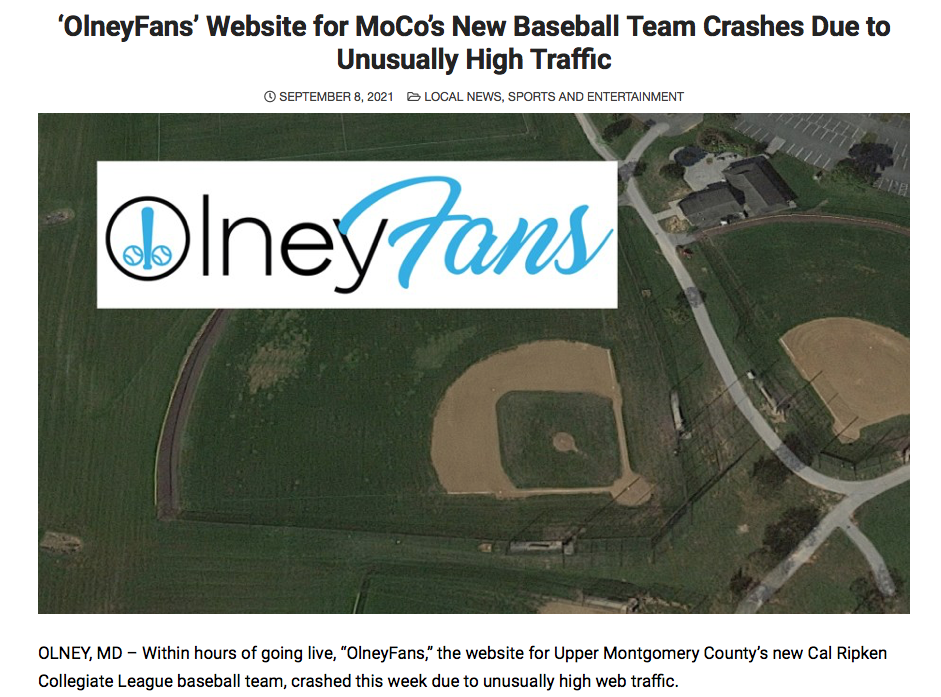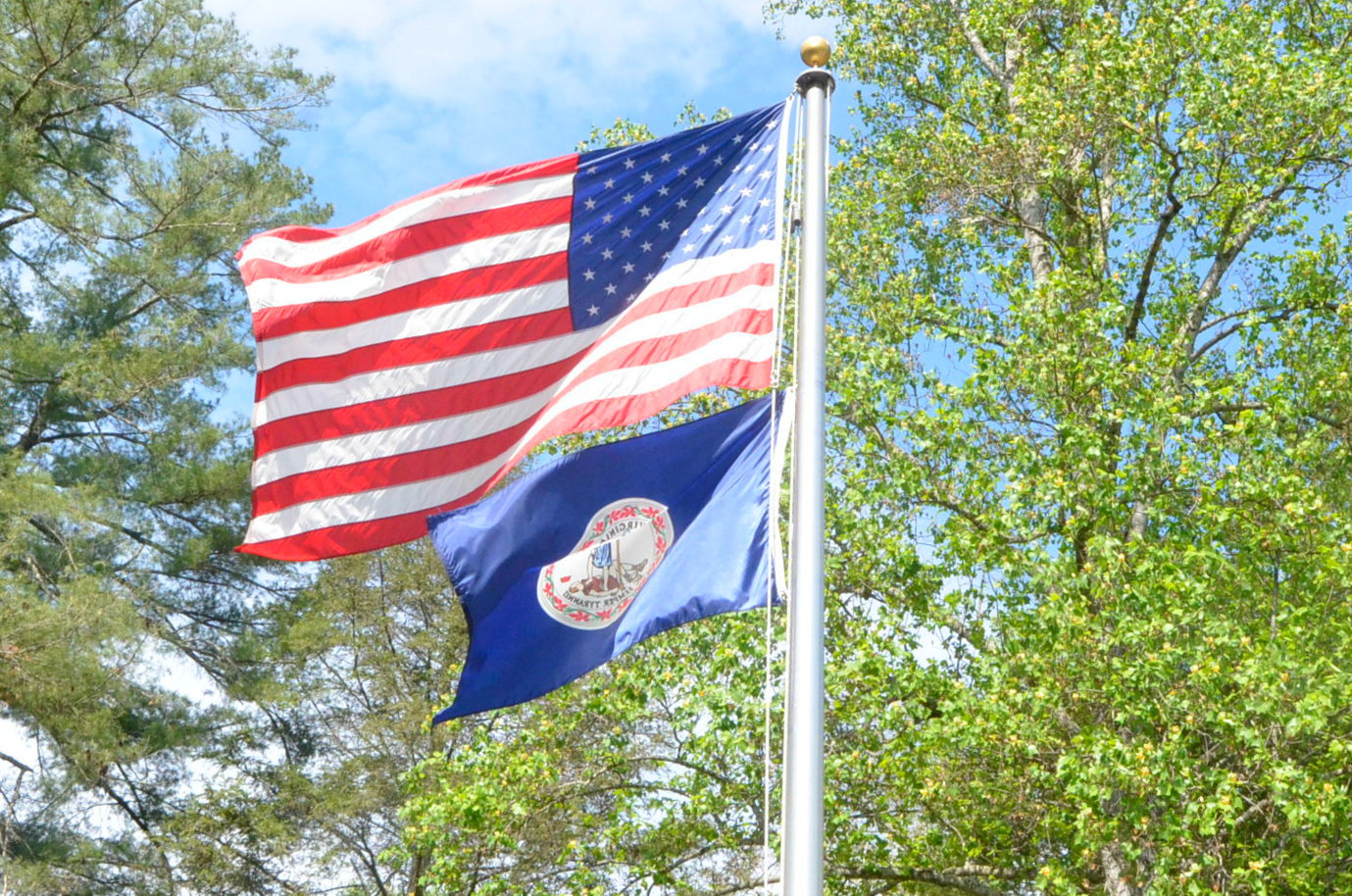The Takoma Torch website usually restrains its satire to the stereotypically granola-loving Washington suburb it’s named for: One recent article contends that Takoma Park has established a two-crate height limit for the Milk Crate Challenge, for instance; another says the “People’s Republic of Takoma Park” has decided to eschew “Bethesdafication” and emulate Chevy Chase instead: “following the exact trajectory to becoming another exclusive enclave for wealthy, white ‘progressives’ who despise most actual progress.”
The publication, a side project for architect Eric Saul, identifies itself as “Takoma Park’s ONLY Humor Source” and further says it’s satirical on its “about” page. But a recent decision to direct its humor “north county” has boomeranged: An organization behind a new Cal Ripken Collegiate Baseball League team in Olney, Maryland, sent a letter via its lawyers over the weekend to the Torch, demanding the removal of an article called “‘OlneyFans’ Website for MoCo’s New Baseball Team Crashes Due to Unusually High Traffic.”
The post imagines Olney’s new team has launched a website called OlneyFans.com, which confuses people looking for the subscription site OnlyFans, and hilarity ensues. It started, as these things do, with the idea of making an “OlneyFans” joke, leaving Saul to find an entity in the quieter, more rural part of Montgomery County to hang it on. “I didn’t know much about the theater,” he says, referring to the town’s well-regarded stafe, but he does love baseball. “I wrote the story as a fun thing to bring some attention to the team in a good way,” he says, adding that in baseball, “jokes like this aren’t uncommon.”
They’re not uncommon on Takoma Torch, either, which lampoons Takoma Park’s Listserv wars and lefty politics: “We’ve written a lot more bolder stories than this one,” he says. “I thought this one was very lighthearted and fun for all.”
Alas, Saul’s baseball bon mot didn’t land as he intended. On Sunday, the Torch tweeted a letter it received from Andrew Schwartz at the Rockville law firm Stein Sperling, which demanded he remove the post or possibly face a lawsuit.
Page 2 pic.twitter.com/0RQZczsjCn
— The Takoma Torch🔥🐓 (@TakomaTorch) September 12, 2021
Saul said he was bewildered by the letter. For starters, he says, “The guy suing me is my friend!” Indeed, Jeff Schwaber, the managing partner at Stein Sperling, confirms that Saul and Tony Korson, the CEO of Koa Sports, an organization behind the team, have coached baseball together and that Saul designed the interior of Koa Sports’ facility for free. Korson called Saul about the article on Friday, Saul says, and he agreed to remove the original graphic for the story, which showed an artist’s rendering of the team’s potential field, and replace it with an aerial photo. “I thought that was the end of it,” he says.
Schwaber says the problem, from his client’s point of view, is that the baseball team is a new organization whose name is being “deliberately confused” with a site known for adult content. But Takoma Torch is clearly a humor publication, I said. Doesn’t the precedent in the Supreme Court case Hustler Magazine, Inc., v. Falwell—which found that the First Amendment protected even offensive speech as long as “that speech could not reasonably have been interpreted as stating actual facts”—protect this sort of joke?
“Look, there is a lot of humor that’s protected speech,” Schwaber replied. “But there are also lines that get crossed.” For instance, he says, Washingtonian could not write an article that accused Schwaber of molesting children and be protected by labeling it satire.
The letter to Takoma Torch notably does not treat the article as a joke—Olney’s new baseball team lacks a website and doesn’t have a logo (the one Takoma Torch constructed a bat-and-balls logo that looks suspiciously like something-else-and-balls), and the people “quoted” in the piece don’t work for the team. The point is not whether the clients “get” the joke, Schwaber says. “The point is that perhaps not every reader who reads it or reads about it firsthand or secondhand is necessarily going to know what’s fact and what’s fiction in the article,” he says.
Takoma Torch, meanwhile, responded to the Olneyites’ letter with even more japes: As if responding to a pitch from a subpar humorist, the Torch told Stein Sperling that it would have to reject the attempt at satire, saying it “did not technically meet our qualifications.”
“I thought that it was clever,” Schwaber says. “I’ll leave it there.”
Ken White, the California attorney and commentator known for the Twitter account Popehat, says “There is absolutely no good faith ethical argument that this is anything but satire.” Olney Baseball’s threat, he says, is “about weaponizing the effects of the legal system”—placing Takoma Torch in the position of either pursuing an expensive defense or giving in. Maryland, White notes, has an “anti-SLAPP” statute, which is intended to discourage suits designed to intimidate criticism, but its statute is weak. White has connected Saul with pro bono lawyers.
It may need them. Takoma Torch, Saul says, is a “small time publication” whose revenue is usually measured in the hundreds of dollars—not exactly the sort of bank account that lets you hire Floyd Abrams. He’s begun to sell $25 T-shirts with the parody Olney Fans logo to raise money in case he needs it to mount a defense. If the legal threat goes away, he says, he’ll donate money from the shirts to the Olney Boys and Girls Club, whose diamond is where the team intends to play its games. Without intending a pun, Saul says “The ball’s really in their court.”



















